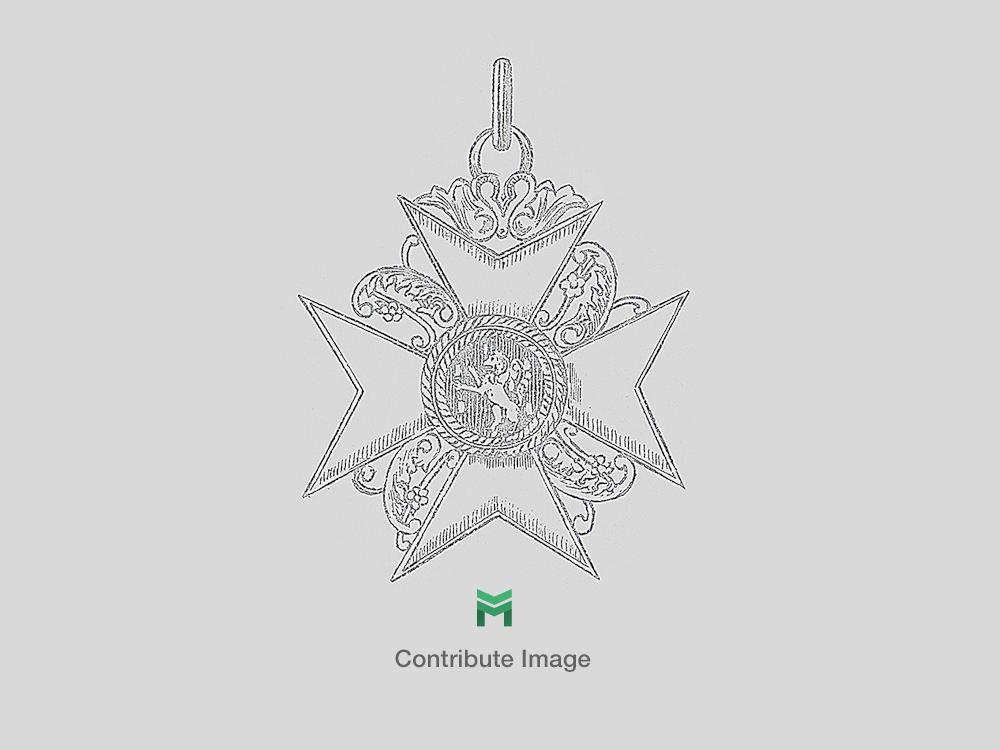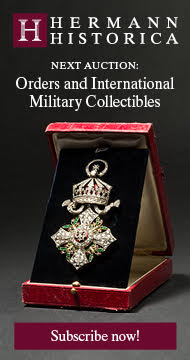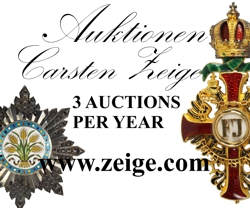Order of the Rue Crown, Badge (reduced size version)
CATEGORY: Version
SKU: 01.SXK.0101.102.01.007
Estimated market value:

Estimated market value:
A Maltese cross, constructed of gold and enamel. The cross is enamelled in green, with broad white enamelled and narrow golden edges. In between the cross arms is a circumferential golden rue wreath. The obverse centre medallion is enamelled in white and features the crowned golden monogram ‘FA’, decorated with oak leaves, inside a green enamelled rue wreath with golden edges. The reverse is similar, except that the centre medallion features the inscription ‘PROVIDENTIAE MEMOR’ (‘mindful of providence’). On a loop for suspension, on a dark green ribbon.
The colour of the cross changed through the years. Crosses from the early 19th century are in a blue-grey green, while crosses from the mid 19th century are in a lighter green.
The Order of the Rue Crown was established by the first King of Saxony, Friedrich August I, under the direction of Napoleon, who was responsible for raising Saxony to a kingdom.
The order was established as the civil counterpart to the Military Order of St. Henry. It may also be known as the Order of the Crown of Saxony. It takes its name from the green floral crown of rue (crancelin) presented in the coat of arms of Saxony. The first award ceremony took place in July 1807, when King Friedrich August I and Emperor Napoleon exchanged medals in Dresden palace.
Originally, the order had a limited membership of 24 knights, but exceptions were made to include members of royalty and prestigious individuals. Royal princes were automatically admitted to the order at birth. Women were not admitted to the order.
The order was only issued in one grade, Knight. A costume was also planned for the knights, consisting of a grass-green velvet coat, skirt, waistcoat and trousers in French form of smooth drao d’or, black, lined with white atlas and embroidered with gold diamond leaves all around. A hat with a white feather, white silk stockings and a gold or gold-plated sword were also worn.
Two Knight Crosses were awarded with diamonds, one to Portuguese Prime Minister Dom Nuno José de Moura Barreto, Duke of Loulé, and one to Chancellor Otto von Bismarck. A third Knight with diamonds belongs to the crown treasure.
From its establishment in 1807 until the fall of the German Empire in 1928, the cross was only awarded 332 times. After 1918, isolated awards are known but not documented.
The order chancellor was chosen from among the knights. He was responsible for keeping the business of the order, including the seals, regulating new admissions, and producing the orderly internal papers. He wore the cross, star, and chain, and was to carry a bag of gold cloth in his left hand with the order seal.
The order treasurer and the order of ceremonies wore the cross en sautoir (around the neck), but without the star. The order secretary and the order archivist carried a reduced-size cross in the button hole.
Two Knight Crosses were awarded with diamonds, one to Portuguese Prime Minister Dom Nuno José de Moura Barreto, Duke of Loulé, and one to Chancellor Otto von Bismarck. A third Knight with diamonds belongs to the crown treasure. The cross could be returned after the death of the recipient, placed in the coffin, or carried forward by family members.
The cross was exclusively made in gold until 1918. The obverse inscription on the badge FA represents "Friedrich August".

Comments
Sign in to comment and reply.


Scroll Top